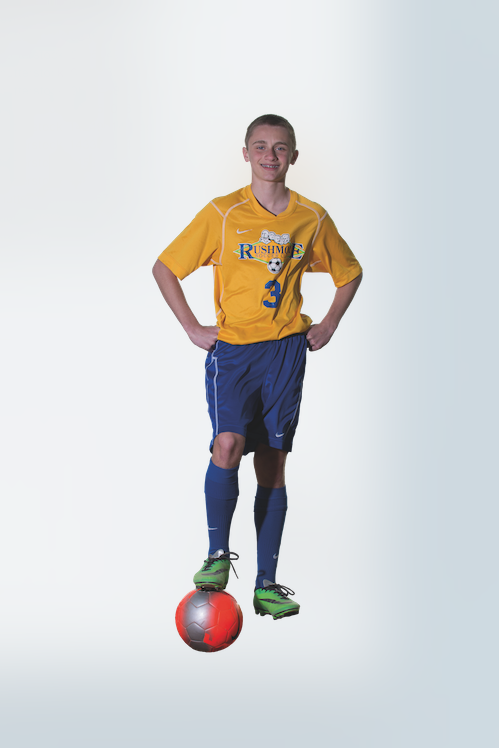Win or lose, soccer families keep coming back to rainy fields, long nights, and hectic schedules because they love the game and opportunities it creates to bring the whole family together–on and off the soccer field.
For years the term “Soccer Mom”has been synonymous with minivans, coolers of orange wedges, bottles of Gatorade, and seats full of kids licking ice cream cones in uniforms with varying degrees of grass stains. These moms have long been known for their steadfast support of their kids’passions, and an unwavering dedication to ensuring their children arrive on time–and in clean uniforms–for every practice and game. They are the cheerleader of their athletes’team, but more importantly–they are the cheerleader for their child’slife… but it’s not just moms anymore.
Soccer is a family affair these days. Parents are not just called on to shuttle minivans full of children from one practice or game to another–though that in and of itself can be a monumental task. In communities like ours with private clubs and teams, soccer parents are stepping up to the sidelines to help in any way they can: fundraising for uniforms, coaches and events, coordinating team travel for tournaments, and yes, bringing nutrition and hydration to the players on the field. With teams playing anywhere from ——games per season and practicing ——times per week, the life of a soccer family is often chaotic–and they wouldn’t have it any other way.
“Soccer is something we all enjoy,”says Kyoko Mumm. “It gives us something to get together for.”Kyoko and her husband Josh are master soccer parents. Their oldest child, Amou Mumm is a freshman in high school and has been playing for a full decade of his fourteen years. His younger brother, Kaito Mumm is 10 years old, and has been playing soccer since he was 4.
Sakura Mumm, the youngest in the family is only six and will be launching her third year of her blossoming soccer career. “It teaches them a good work ethic,”the Mumms say, “and what their role is on a team. Win or lose, at the end of the day we discuss what we did well, ask our children if they had fun, and then ask what they want for a treat. Win or lose, it’s normally ice cream.”
For the Mumms, soccer is a “sport for life”. Josh grew up playing in Sturgis, Spearfish, and Rapid City–and even played college ball at National American University. The Mumms chose soccer because “anyone can play this game. It doesn’t matter your size or athletic ability. Soccer is a player’s game. The coach can make substitutions, teach technique, and show what to do in different situations–but when it is game time, the players are the ones on the field and it’s their time to decide what needs to be done.”Despite the scheduling frenzy incurred with three children on different teams, and two also in band,“this is a life that we would choose over and over again.”
Jenn and Clay McClain agree. Clay grew up playing soccer in Rapid City, too–as well as competing in college. Jenn and Clay have spent much of their lives on both sides of the field–as coaches, and as cheering parents to their two young players: Jameson–a sophomore in high school that has been playing for ten years, and Marley–a 7th grader that has been playing since she was 8. “We have made so many amazing family friends through soccer,”Jenn says. “Rapid City has a great soccer program. I would recommend soccer to anyone with young children looking to get into a sport. We’ve coached some amazing kids. Not always the best soccer players, but great kids–and in the big scheme of things…that’s what’s important.”
Soccer families agree the sport nurtures great kids, teaching lessons that will serve them well for the rest of their lives. Lessons like teamwork, time management, courage, and–of course–sportsmanship…a lesson important for parents, too. It can be easy to get caught up in the competition and miss out on the fun. Jenn suggests that parents remember to let the coach do his or her joband take a cheerleader role on the sidelines in support of their child. “As a coach, I hold high expectations, but understand that every team wins and loses at some point in time.”Loses–both in soccer and in life–are a great opportunity for growth and improvement, a chance to look back and see what could have been done differently. “Winning is fun,”she says, “but losing takes heart.”
“I actually think the boys deal with the losses better than the parents at times,”says Nora Vanden Bos. “The coach has a lot to do with the way they react and Mike (Fairchild) has done a great job with that.”Nora and Jerry Vanden Bos have been soccer parents for the last 8 years since their youngest childLeviwas just five years old. The teenager plays basketball and runs track at school “but soccer is his favorite,”his mother says.
“We’ve been traveling together quite a bit,”Nora says, “which I think is fun.” The Vanden Bos family enjoys watching Levi play soccer, “and seeing him grow in his ability and confidence.”


Jared Hansen has been diagnosed with cancer for the sixth time in eight years. He’s feeling well, though, and–at least for now–won’t be facing any more treatment. It has certainly not been an easy road, but in true soccer family style, they have pulled together as a team–and their teams have supported them. Both kids’teams have held fundraisers and gathered donations to help offset the cost of Jared’s treatment and time away from his contracting business. “Everyone has been so great–both teams. It’s not easy,”Carey admits, “but we make it work.”The kidshave taken a role on the sidelines of their father’s battle, too, cheering him on as he fights through yet another round with a formidable foe. “They are definitely daddy’s kids,”Carey says with a laugh. They are a strong team, traveling together to Minnesota for Jared’s treatments and pitching in to keep life at home running smoothly. The whole family epitomizes American soccer superstar Alex Morgan’s quote: “The main thing players and coaches have taught me, is to always work hard, never give up, and fight until the end, because it’s never really over until the whistle blows.”


Win or lose, soccer families keep coming back to rainy fields, long nights, and hectic schedules because they love the game–and opportunities it creates to bring the whole family–on and off the field.



